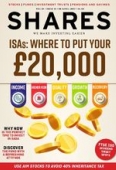Archived article
Please note that tax, investment, pension and ISA rules can change and the information and any views contained in this article may now be inaccurate.
Profit from private equity

Investors seeking exposure to innovative growth businesses should look at private equity funds. They can be a terrific source of opportunity despite the high leverage and fees associated with the industry.
QuotedData senior analyst Matthew Read explains: ‘Private equity is an asset class that is less correlated with traditional equity markets and thus, another means of diversifying returns.
‘Private equity investments tend to be managed with a more absolute mindset and so, at a time where listed global equity markets are trading at or close to all-time highs, this could prove to be particularly useful and offer some resilience on the downside.’
Read says managers in the sector will argue that although their investments are less liquid they have more information and can exert greater influence.
The QuotedData man claims private equity managers took advantage of a capital raising window in 2016. Encouragingly, with a generally improving economic outlook, ‘managers are gradually putting their cash piles to work. That said cash levels still appear to be quite high and so funds such as Standard Life Private Equity (SLPE) should be well positioned in the event of a market dislocation.’
Standard Life Private Equity, a European-focused private equity fund of funds, saw net asset value move up 4.3% to 361.2p in the quarter to December. Strategy changes, including more than doubling the dividend to 12p for 2017, the removal of size and geographic restrictions, and simplifying its management fee structure, should help narrow its discount to net asset value.
Ways to play
The private equity sector, one requiring patience given its long-term nature, also includes the likes of buyouts-to-infrastructure focused 3i (III), Northern Investors (NRI) and NB Private Equity Partners (NBPE).
Continuing to deliver a strong NAV performance is HgCapital Trust (HGT), offering exposure to a portfolio of high-growth unquoted companies in Europe. ‘While there are better value opportunities in the listed private equity sector at present,’ writes Winterflood Investment Trusts, ‘we continue to regard HgCapital Trust as “best-in-class” and worthy of trading on a premium to its peers.’
Pantheon appeals
Pantheon International (PIN) is the longest established private equity fund-of-funds on the London Stock Exchange and trades with ordinary and redeemable share lines.
The trust is managed by Pantheon, one of the world’s leading private equity specialists. It has outperformed the FTSE All-Share and MSCI World since inception in 1987. It seeks to maximise capital growth for shareholders by investing in a diversified portfolio of private equity funds and occasionally directly in private companies.
With the ordinary shares trading at a 17.1% discount to NAV, the trust may tempt value investors.
‘We’re trying to invest in the best managers globally,’ says seasoned private equity investor Andrew Lebus, a senior member of Pantheon’s investment team. Lebus insists ‘long-term investors that don’t need liquidity should absolutely be trying to get access to private equity. We are constantly getting cash in from our portfolio distributions and we can redeploy those distributions over a four to five-year period.’
Pantheon’s half year results (14 Mar) show NAV increased by 12% to £20.90, while net assets increased to £1.32bn with a helping hand from currency. Cash-generative Pantheon, whose 10 largest managers include well-known buyout funds Texas Pacific and Warburg Pincus, ‘offers investors well-managed, highly diversified exposure to the private equity asset class and it remains one of our recommendations in this sector,’ according to Winterflood Investment Trusts.
Princely progress
Also making positive progress is F&C Private Equity Trust (FPEO), whose 2016 results revealed a 23% net asset value total return (including dividends), comfortably ahead of the FTSE All-Share’s 16.8% total return.
The Hamish Mair-managed trust generated almost £70m of realisations in 2016, nearly matching 2015’s record breaking year, as well as earnings progress in the underlying portfolio. Exposure to around 400 companies, through over 80 funds and 20 co-investments, means the trust is reassuringly diversified.
Important information:
These articles are provided by Shares magazine which is published by AJ Bell Media, a part of AJ Bell. Shares is not written by AJ Bell.
Shares is provided for your general information and use and is not a personal recommendation to invest. It is not intended to be relied upon by you in making or not making any investment decisions. The investments referred to in these articles will not be suitable for all investors. If in doubt please seek appropriate independent financial advice.
Investors acting on the information in these articles do so at their own risk and AJ Bell Media and its staff do not accept liability for losses suffered by investors as a result of their investment decisions.
Issue contents
Big News
- Special dividend on cards for Central Asia Metals?
- FTSE 100 dividend delight on overseas earnings boost
- Margin pressure hits ASOS
- Polar Capital makes a mint after Miton raid
- Brace yourself for more British takeovers
- CityFibre seeks fresh funding deal
- Sophos shines and shares at record high
- Genus gets green light to launch GSS

 magazine
magazine
![iStock-495215934 [Converted]](http://www.sharesmagazine.co.uk/wp-content/uploads/2017/04/iStock-495215934-Converted-475x284.jpg)

![iStock-495213850 [Converted]](http://www.sharesmagazine.co.uk/wp-content/uploads/2017/04/iStock-495213850-Converted-475x284.jpg)









